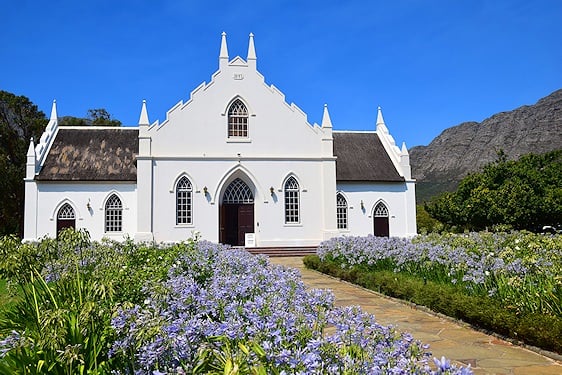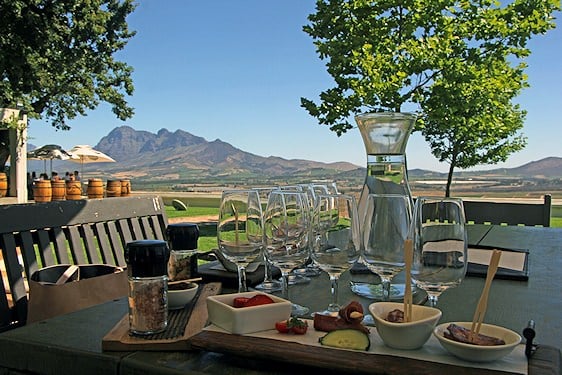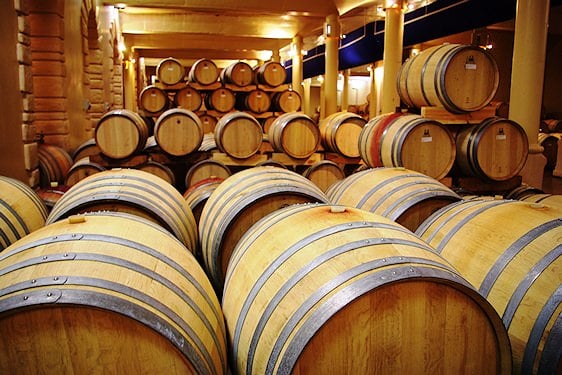Cape Winelands Travel and Vacations
Help Me Plan- Home
- >
- African Travel
- >
- South Africa
- >
- Cape Winelands
Cape Winelands Destination Guide
The Cape Winelands combine historic estates, mountain scenery, and a world-class food-and-wine culture. Most travelers pair two to three nights here with Cape Town or the Garden Route, using Franschhoek or Stellenbosch as a base. Expect polished tastings, farm-to-table dining, art, and gentle outdoor pursuits in a relaxed, Mediterranean-climate setting.
Getting to the Cape Winelands
By Air: The Cape Winelands are easily accessible via Cape Town International Airport, about an hour’s drive from most towns in the region. Cape Town International receives flights from across the world daily, along with regular domestic flights from Johannesburg and the Kruger Park area.
By Road: From Cape Town, the Winelands towns are between 40 minutes and an hour’s drive from the city. If you’re traveling from the Garden Route, the trip is typically four to five hours, depending on whether you opt for Route 62 through the Little Karoo or the N2 highway through the pastoral Overberg.
Weather & Best Time To Visit
The Cape Winelands are a year-round destination because your activities will primarily be centered around tasting and dining. Like Cape Town, the region sports a Mediterranean climate with dry, sunny summers (October to March), where average temperatures are warm to hot — in some areas it can reach 40°C (104°F). While you can still enjoy delectable tastings, the peak of summer (January and February) can be stifling in the Winelands if there is no wind.
Winters (June to August) can be cool, with average minimum temperatures around 5°C (41°F) and maximums around 17°C (63°F). There are still warm, sunny days throughout this period. Rainfall is frequent, with occasional dustings of snow on higher peaks. Do not let the winter rainfall deter you — the rains are typically light drizzles, which can shroud the Winelands in an ethereal mist that’s lovely to behold.
Medical Considerations
The Cape Winelands are located in a malaria-free part of South Africa. The main medical considerations are to ensure that your routine vaccinations are up to date and that you bring along any prescription medication you might be taking.
Safety
Crime rates in the Boland are relatively low, and it is pleasant to walk along the main street of Franschhoek at night, with restaurants festively lit for dinner. Nevertheless, avoid quiet areas after dark and follow the advice of your guide.
Recommended Reading (Cape Winelands)
- South Africa’s Winelands of the Cape – by Gerald & Marc Hoberman
- The Cape Winelands Coffee Table Book – by Alain Proust & Tony Stern
- DK Top 10 Cape Town and the Winelands – by Philip Briggs
Web Resources
Top Attractions of the Cape Winelands
Enjoy an astounding diversity of adventure, culinary, historical, and cultural activities in the Winelands; the key draw remains the wine routes.
An inherent French flair characterizes the Franschhoek Wine Route. The town is rich in Huguenot history and is South Africa's unofficial food and wine capital. Be sure to visit one of the award-winning restaurants in this charming town.
The Paarl Wine Route is known for the famous Nederburg Wine Estate, the much-loved Fairview Wine and Cheese Farm, and the KWV Wine Emporium, home to one of South Africa’s most significant cellars.
The Stellenbosch Wine Route is South Africa's oldest wine route and surrounds the country's second-oldest town. Some of South Africa's finest wines originate in this scenic region.
Cape Winelands Vacation Options & Travel Tips
Tours to the Winelands are often combined with visits to Cape Town, roughly 70 km (43 miles) away, and the Garden Route, about 400 km (249 miles) to the east. The collective beauty of the Western Cape is breathtaking.

Tours, Safaris & Honeymoons
Browse our thoughtfully crafted safari tours.

Tailor-Made Vacation Packages
All our tours and safaris can be customized.

Travel Tips & Advice
Important information about visiting Southern Africa.
Recommended Accommodation
The region is home to various hotels, guest houses, and wine farms that offer quality accommodations. These are our top picks.
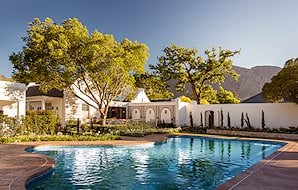
Leeu House
Leeu House is an intimate boutique hotel situated in the heart of the village of Franschhoek.
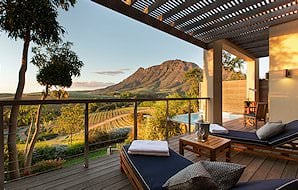
Delaire Graff
A magnificent setting atop Helshoogte Pass provides the backdrop to this exclusive accommodation.
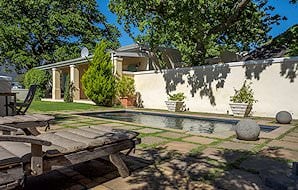
Auberge Clermont
Auberge Clermont offers luxury guest house accommodation on a historic farm in the Franschhoek valley.
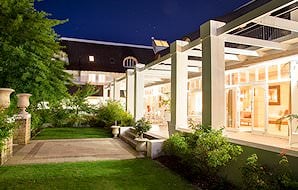
Le Franschhoek
Le Franschhoek offers luxury accommodation on the outskirts of the town with which it shares a name.
Cape Winelands Video and Facts
The region is a drive of about 40 minutes from Cape Town. It is divided into several main areas and is the largest wine-producing region in South Africa.
Foods to Try When Visiting the Winelands
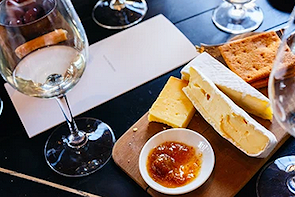
Cheese
Nothing complements a good glass of wine quite like quality cheese. This delectable culinary tradition thrives in the Boland, and some of South Africa's most pleasing cheeses are produced here. Many wine farms offer pairings or platters.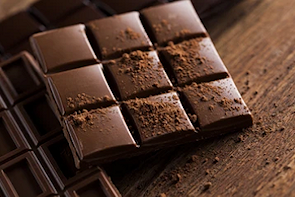
Chocolate
Chocolate pairings are increasingly popular if your taste buds lean more toward sweet rather than savory. These confections are typically artisan. Every August, Blaauwklippen Wine Estate has hosted the Winelands Chocolate Festival (confirm current dates).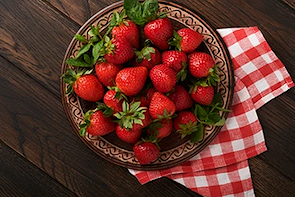
Strawberries
Between October and December, strawberry picking is a popular pastime in the Winelands. The advent of summer means these succulent scarlet fruits are at their best. Put on a hat, pile up your basket, and feast from the source.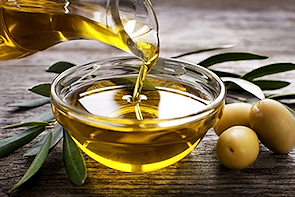
Olive Oil
South Africa's high-quality olive oils have started making waves in international competitions, often beating heavyweights like Italy, Spain, and Greece. The Boland's Mediterranean-like climate provides ideal conditions for groves to flourish.Cape Winelands FAQ
Yes – the Cape Winelands will also appeal to adventurous spirits who enjoy outdoor pursuits like hiking and mountain biking, or leisure seekers who wish to relish a good meal and unwind in tranquil surroundings. Depending on your interests, the region's history is also captivating.
Yes, if you have a particular wine farm in mind. There is an abundance of cultivars and award-winning wines produced in this region of South Africa. The wine farms visited on your tour are typically determined following a discussion of preferences between you and your guide.
Absolutely. The Winelands are home to some of South Africa's finest restaurants — notably Dusk and MERTIA in Stellenbosch, and La Petite Colombe and Haute Cabrière in Franschhoek. Reservations are highly recommended, and we will gladly assist with bookings.
The guest houses, wine farms, and hotels we use for accommodation are typically either in Franschhoek or Stellenbosch, with a small handful on the edge of Paarl. The town of Franschhoek has a splendid setting and is arguably the finest base from which to explore the Winelands.
Depending on the town or wine farm you are heading for, the Winelands are between 40 minutes and an hour's drive from Cape Town.
Yes. A few wine farms offer grape juice tastings, so children can participate, while others indulge the little ones with chocolate tastings. There is also an abundance of family-friendly activities on offer. Our favorite wine estates to visit with families are Spier near Stellenbosch, Vergelegen outside Somerset West, and Allée Bleue in the Franschhoek area.
We usually limit the number of wine farms for a day of tastings to three to ensure that our guests do not feel rushed and can enjoy each farm's unique setting. However, we pride ourselves in our flexibility — should you be keen for more, discuss your preferences with your guide, and we will adapt accordingly.
Yes, Spier Wine Farm rehabilitates birds of prey at 'Eagle Encounters', while the Cheetah Outreach in Paardevlei provides visitors with the opportunity to get up close to this majestic endangered big cat.
Yes – the grape variety 'Pinotage' is a unique crossing of Pinot Noir and Cinsaut. South Africa's signature red grape was developed in 1924 by Professor Abraham Izak Perold at Stellenbosch University. Some of the finest Pinotage wines you can sample are Kanonkop Pinotage, Beeslaar Pinotage, and Beyerskloof Diesel Pinotage.
Though any answer would be largely subjective, farms like Kanonkop (Stellenbosch), Boekenhoutskloof (Franschhoek), and Vergelegen (Somerset West / Helderberg) have consistently established themselves as leading wineries. A visit to L'Ormarins, which forms part of the Anthonij Rupert Wyne Portfolio, is always rewarding for the scenery, the added attraction of the Franschhoek Motor Museum, and the quality of the Cap Classique bottle-fermented sparkling wines.
A Brief History
The Early Days
South Africa’s wine story begins with European settlement at the Cape. The first wines were made by Jan van Riebeeck in 1659. In 1685, Governor Simon van der Stel founded Constantia on the Cape Peninsula. The sweet wines produced here later gained international fame as “Vin de Constance.” Jane Austen, Frederick the Great, and Napoleon are among the famous individuals who enjoyed this wine. From 1688 onward, French Huguenot refugees brought skills and vine cuttings that helped spread viticulture inland. Towns like Stellenbosch, Franschhoek, and Paarl emerged as early centers of production. The region surrounding these towns is now home to historic estates such as Boschendal, Vergelegen, Nederburg, and Meerlust.
Wine Industry Growth
The 19th century brought both expansion and setbacks. Phylloxera devastated vineyards in the late 1800s, making it necessary to replant large sections. In 1918, producers formed the KWV to stabilize pricing and plantings. Important modernizing steps followed: the Wine of Origin (WO) system was launched in 1973 to codify geographic origin, cultivar, and vintage. This encouraged quality and regional identity. International sanctions during the apartheid era limited exports.
After 1994, reopening to global markets triggered a wave of investment. Sustainability initiatives gained traction—most notably Integrated Production of Wine (IPW)—and the term “Cap Classique” became the local standard for traditional-method sparkling wines. Movements such as the Swartland Renaissance and the Old Vine Project brought renewed respect to dry-farmed bush vines and heritage parcels.
The Present
Today, the Cape Winelands combine deep heritage with modern craftsmanship. Stellenbosch, Franschhoek, Paarl, Constantia, Robertson, and beyond produce wines that compete internationally—Chenin Blanc and Cabernet Sauvignon lead the charge, with Pinotage, Syrah, Chardonnay, and Mediterranean varieties adding breadth. Wine tourism is a pillar of the regional economy: polished tasting rooms, farm-to-table dining, and experiential offerings (from vineyard safaris to art collections) make the Winelands a year-round destination. With a strong sustainability ethos and a new generation of winemakers championing site expression, South Africa’s wine industry is firmly future-focused while honoring the vineyards and traditions that shaped it.
Main Towns
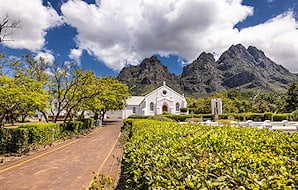
Stellenbosch
Stellenbosch was founded in 1679 by Dutch Governor Simon van der Stel. The architectural jewel is the second-oldest town in South Africa and lies at the heart of the Winelands. Stellenbosch is known for its university — the first Afrikaans-language institution in South Africa — and for having the largest number of Cape Dutch houses of any town in the region. The most harmonious examples are on Dorp, Church, and Drostdy streets.
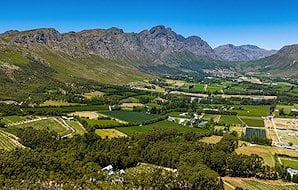
Franschhoek
Franschhoek (“French Corner”) is named for the French Huguenots who settled here in the 18th century. The Huguenot Museum and the Huguenot Monument, completed in 1943, recall the history of these Protestant refugees persecuted by Louis XIV. Blessed with one of the most beautiful settings in the Winelands, Franschhoek is ideal for an al fresco lunch at one of its superb restaurants.
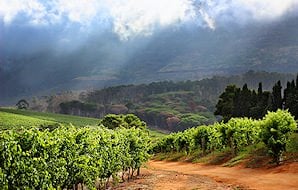
Paarl
Paarl (Afrikaans for “pearl”) is named for the polished granite domed mountain that rises behind it. Founded in 1720, Paarl’s wine route includes some of the finest vineyards and several first-class restaurants. On the southern slope of Paarl Mountain, you’ll find the Afrikaans Taal (Language) Monument, a slender granite needle erected in 1975 to commemorate the centenary of Afrikaans being recognized as an official language.

